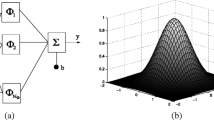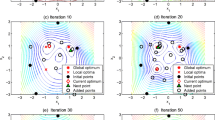Abstract
Reliability-based design optimization (RBDO) has been widely used to search for the optimal design under the presence of parameter uncertainty in the engineering application. Unlike traditional deterministic optimization, RBDO problem takes the uncertainty of design variables and probabilistic reliability constraints into consideration. In the context of RBDO, a large number of model evaluations are required in the reliability analysis to estimate the failure probability. However, the intensive computation of reliability analysis makes it infeasible to address complex and expensive problems. In order to relieve the computational burden, an efficient polynomial chaos-enhanced radial basis function (PCE-RBF) approach is proposed. In this approach, RBF combined with sparse PC method is constructed to enhance predictive accuracy of metamodel. To refine the metamodel, local variation with minimum distance sampling criterion is proposed to select the sample points sequentially. Then, the refined PCE-RBF metamodel with acceptable accuracy is used to perform gradient-based optimization for solving RBDO problem. The performance of the proposed method is validated by four benchmark examples and truss structure issue.













Similar content being viewed by others
References
Abraham S, Raisee M, Ghorbaniasl G et al (2017) A robust and efficient stepwise regression method for building sparse polynomial chaos expansions. J Comput Phys 332:461–474
Aoues Y, Chateauneuf A (2010) Benchmark study of numerical methods for reliability-based design optimization. Struct Multidiscip Optim 41(2):277–294
Bichon BJ, Eldred MS, Swiler LP et al (2008) Efficient global reliability analysis for nonlinear implicit performance functions. AIAA J 46(10):2459–2468
Blatman G, Sudret B (2011) Adaptive sparse polynomial chaos expansion based on least angle regression. J Comput Phys 230(6):2345–2367
Bonnans JF, Gilbert J, Lemaréchal C et al (2003) Numerical optimization. Springer, Heidelberg
Chen ZZ, Qiu HB, Gao L (2013) An adaptive decoupling approach for reliability-based design optimization. Comput Struct 117:58–66
Chen ZZ, Qiu HB, Gao L et al (2014) A local adaptive sampling method for reliability-based design optimization using Kriging model. Struct Multidiscip Optim 49(3):401–416
Chiralaksanakul A, Mahadevan S (2005) First-order approximation methods in reliability-based design optimization. J Mech Des 127(5):851–857
Cho TM, Lee BC (2011) Reliability-based design optimization using convex linearization and sequential optimization and reliability assessment method. Struct Saf 33(1):42–50
Damblin G, Couplet M, Iooss B (2013) Numerical studies of space-filling designs: optimization of Latin hypercube samples and subprojection properties. J Simul 7(4):276–289
Dersjo T, Olsson M (2011) Reliability based design optimization using a single constraint approximation point. J Mech Des 133(3):031006
Du XP, Chen W (2004) Sequential optimization and reliability assessment method for efficient probabilistic design. J Mech Des 126(2):226–233
Dubourg V, Sudret B, Bourinet JM (2011) Reliability-based design optimization using kriging surrogates and subset simulation. Struct Multidiscip Optim 44(5):673–690
Durantin C, Rouxel J, D’esid’eri JA et al (2017) Multifidelity surrogate modeling based on radial basis functions. Struct Multidiscip Optim 56(5):1061–1075
Echard B, Gayton N, Lemaire M (2011) AK-MCS: an active learning reliability method combining Kriging and Monte Carlo simulation. Struct Saf 33(2):145–154
Garud SS, Karimi IA, Kraft M (2017) Design of computer experiments: a review. Comput Chem Eng 106:71–95
George H, Cheng TG, Wang GG (2018) An adaptive aggregation-based approach for expensively constrained black-box optimization problems. J Mech Des 140(9):091402
Guillen-Gosalbez G, Grossmann I (2010) A global optimization strategy for the environmentally conscious design of chemical supply chains under uncertainty in the damage assessment model. Comput Chem Eng 34(1):42–58
Gutmann HM (2001) A radial basis function method for global optimization. J Glob Optim 19(3):201–227
Hardy LR (1971) Multi-quadratic equations of topography and other irregular surfaces. J Geophys Res Atmos 76(8):1905–1915
Hastie T, Tibshirani R, Friedman J (2001) The elements of statistical learning. Springer, New York
Herrera LJ, Pomares H, Rojas I et al (2011) Global and local modelling in RBF networks. Neurocomputing 74(16):2594–2602
Hu XZ, Chen XQ, Parks GT et al (2016) Review of improved Monte Carlo methods in uncertainty-based design optimization for aerospace vehicles. Prog Aerosp Sci 86:20–27
** R, Chen W, Simpson TW (2001) Comparative studies of metamodelling techniques under multiple modelling criteria. Struct Multidiscip Optim 23(1):1–13
Ju BH, Lee BC (2008) Reliability-based design optimization using a moment method and Kriging metamodel. Eng Optim 40:421–438
Keshavarzzadeh V, Fernandez F, Tortorelli DA (2017) Topology optimization under uncertainty via non-intrusive polynomial chaos expansion. Comput Methods Appl Mech Eng 318:120–147
Kiureghian AD, Stefano MD (1991) Efficient algorithm for second order reliability analysis. J Eng Mech 117(12):2904–2923
Lee TH, Jung JJ (2008) A sampling technique enhancing accuracy and efficiency of metamodel-based RBDO: constraint boundary sampling. Comput Struct 86(13–14):1463–1476
Li W, Lu LL, **e XT et al (2017) A novel extension algorithm for optimized Latin hypercube sampling. J Stat Comput Simul 87(13):2549–2559
Li X, Gong CL, Gu LX et al (2019) A reliability-based optimization method using sequential surrogate model and Monte Carlo simulation. Struct Multidiscip Optim 59(2):439–460
Meng Z, Keshtegar B (2019) Adaptive conjugate single-loop method for efficient reliability-based design and topology optimization. Comput Methods Appl Mech Eng 344:95–119
Queipo NV, Haftka RT, Shyy W et al (2005) Surrogate-based analysis and optimization. Prog Aerosp Sci 41(1):1–28
Rahman S, Xu H (2004) A univariate dimension-reduction method for multi-dimensional integration in stochastic mechanics. Probab Eng Mech 19(4):393–408
Schoebi R, Sudret B, Wart J (2015) Polynomial-chao-based Kriging. Int J Uncertain Quantif 5(2):171–193
Shah H, Hosder S, Koziel S et al (2015) Multi-fidelity robust aerodynamic design optimization under mixed uncertainty. Aerosp Sci Technol 45:17–29
Shan SQ, Wang GG (2010) Survey of modeling and optimization strategies to solve high-dimensional design problems with computationally-expensive black-box functions. Struct Multidiscip Optim 41(2):219–241
Shang XB, Chao T, Ma P et al (2019) An efficient local search-based genetic algorithm for constructing optimal Latin hypercube design. Eng Optim 52(2):271–287
Shang, XB, Chao T, Ma P, et al. (2020) Derivative-based Global Sensitivity Measure using Radial Basis Function 62 (1): 107–129
Shao Q, Younes A, Fahs M et al (2017) Bayesian sparse polynomial chaos expansion for global sensitivity analysis. Comput Methods Appl Mech Eng 318:474–496
Sudret B, Mai CV (2015) Computing derivative-based global sensitivity measures using polynomial chaos expansions. Reliab Eng Syst Saf 134:241–250
Tori AJ, Lopez RH, Miguel LFF (2016) A general RBDO decoupling approach for different reliability analysis methods. Struct Multidiscip Optim 54(2):317–332
Torre E, Marelli S, Embrechts P et al (2019) Data-driven polynomial chaos expansion for machine learning regression. J Comput Phys 388:601–623
Valdebenit MA, Schuëller GI (2010) A survey on approaches for reliability-based optimization. Struct Multidiscip Optim 42(5):645–663
Viana FAC, Simpson TW, Balabanov V et al (2014) Metamodeling in multidisciplinary design optimization: how far have we really come? AIAA J 52(4):670–690
Wang GG, Shan S (2007) Review of metamodeling techniques in support of engineering design optimization. J Mech Des 129(4):370–380
Wang J, Pan L, Bian Y et al (2020) Experimental investigation of the surface roughness of finish-machined high-volume-fraction SiCp/Al composites. Arab J Sci Eng. https://doi.org/10.1007/s13369-020-04421-w
Wiener N (1938) The homogeneous chaos. Am J Math 60:897–936
Wu ZP, Wang DH, Okolo NP et al (2016) Global sensitivity analysis using a Gaussian radial basis function metamodel. Reliab Eng Syst Saf 154:171–179
Yang X, Liu Y, Mi C et al (2018) Active learning Kriging model combining with kernel density-estimation-based importance sampling method for the estimation of low failure probability. ASME J Mech Des 140(5):051402
Yi P, Zhu Z, Gong J (2016) An approximate sequential optimization and reliability assessment method for reliability-based design optimization. Struct Multidiscip Optim 54(6):1367–1378
Zhao W, Bu LZ (2019) Global sensitivity analysis with a hierarchical sparse metamodeling method. Mech Syst Signal Process 115:769–781
Funding
This work was financially supported by the National Natural Science Foundation of China (NSFC) (Grant numbers 61627810, 61790562, and 61403096).
Author information
Authors and Affiliations
Corresponding author
Ethics declarations
Conflict of interest
The authors declare that they have no conflict of interest.
Replication of results
All the datasets in this study are generated by using MATLAB codes. The full datasets, as well as the source codes, can be available from the corresponding author with a reasonable request.
Additional information
Responsible Editor: Nestor V Queipo
Publisher's note
Springer Nature remains neutral with regard to jurisdictional claims in published maps and institutional affiliations.
Rights and permissions
About this article
Cite this article
Shang, X., Ma, P., Yang, M. et al. An efficient polynomial chaos-enhanced radial basis function approach for reliability-based design optimization. Struct Multidisc Optim 63, 789–805 (2021). https://doi.org/10.1007/s00158-020-02730-0
Received:
Revised:
Accepted:
Published:
Issue Date:
DOI: https://doi.org/10.1007/s00158-020-02730-0




